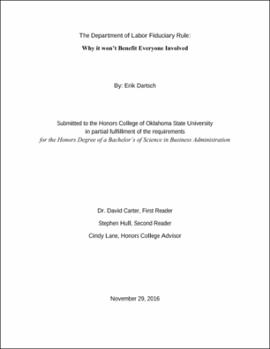| dc.contributor.author | Dartsch, Erik | |
| dc.date.accessioned | 2021-04-19T21:27:23Z | |
| dc.date.available | 2021-04-19T21:27:23Z | |
| dc.date.issued | 2016-11-29 | |
| dc.identifier | oksd_dartsch_HT_2016 | |
| dc.identifier.uri | https://hdl.handle.net/11244/329300 | |
| dc.description.abstract | In April of 2016 the Department of Labor implemented a new rule that will affect millions of Americans. The goal of this rule is to protect middle class investors from unnecessary investment fees and to save retirement investors billions of dollars a year. The goal of the rule has very good intentions; however it will not benefit everyone. The rule is very complex and will impact the investment management industry indefinitely. The primary change the rule brings is the requirement for financial advisors to have a fiduciary relationship with their clients. Through research and analysis the impact of this rule can be concluded on both a qualitative and quantitative level. As with any reform there are almost always consequences, and the Department of Labor Fiduciary ruling is no different. | |
| dc.format | application/pdf | |
| dc.language | en_US | |
| dc.rights | Copyright is held by the author who has granted the Oklahoma State University Library the non-exclusive right to share this material in its institutional repository. Contact Digital Library Services at lib-dls@okstate.edu or 405-744-9161 for the permission policy on the use, reproduction or distribution of this material. | |
| dc.title | Department of Labor fiduciary rule: Why it won't benefit everyone involved | |
| osu.filename | oksd_dartsch_HT_2016.pdf | |
| dc.type.genre | Honors Thesis | |
| dc.type.material | Text | |
| dc.contributor.director | Carter, David A. | |
| dc.contributor.facultyreader | Hull, Stephen | |
| thesis.degree.discipline | Finance | |
| thesis.degree.grantor | Oklahoma State University | |
